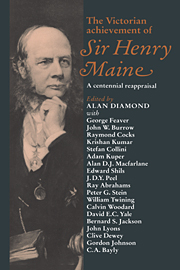Book contents
- Frontmatter
- Contents
- Notes on contributors
- Foreword by Sir John Lyons
- Introduction
- 1 The Victorian values of Sir Henry Maine
- PART 1 MAINE AND THE IDEA OF PROGRESS
- PART 2 MAINE AND THE SOCIAL SCIENCES
- PART 3 MAINE ON LAW, LEGAL CHANGE AND LEGAL EDUCATION
- 11 Maine and legal education
- 12 Maine and legal education: a comment
- 13 A wake (or awakening?) for historical jurisprudence
- 14 Further thoughts on Maine's historical jurisprudence
- 15 Fictions, equity and legislation: Maine's three agencies of legal change
- 16 Law and language: a metaphor in Maine, a model for his successors?
- 17 Linguistics and law: the legacy of Sir Henry Maine
- PART 4 MAINE AND INDIA
- Appendix: the conference programme
- Bibliography
- Index
16 - Law and language: a metaphor in Maine, a model for his successors?
Published online by Cambridge University Press: 04 September 2009
- Frontmatter
- Contents
- Notes on contributors
- Foreword by Sir John Lyons
- Introduction
- 1 The Victorian values of Sir Henry Maine
- PART 1 MAINE AND THE IDEA OF PROGRESS
- PART 2 MAINE AND THE SOCIAL SCIENCES
- PART 3 MAINE ON LAW, LEGAL CHANGE AND LEGAL EDUCATION
- 11 Maine and legal education
- 12 Maine and legal education: a comment
- 13 A wake (or awakening?) for historical jurisprudence
- 14 Further thoughts on Maine's historical jurisprudence
- 15 Fictions, equity and legislation: Maine's three agencies of legal change
- 16 Law and language: a metaphor in Maine, a model for his successors?
- 17 Linguistics and law: the legacy of Sir Henry Maine
- PART 4 MAINE AND INDIA
- Appendix: the conference programme
- Bibliography
- Index
Summary
ABSTRACT
Part A of this chapter considers Maine's conception of the relationship between law and language. For him, comparative philology was the dominant paradigm of linguistics. He used it for the most part non-technically, as a model to support his view of parallel development within a particular family of legal systems: the Indo-European group. But the model does not fit Maine's views in all respects. Most importantly, Maine failed to grasp the significance of the distinction between merely semantic parallels and historical etymological derivations.
Part B considers whether the parallel between law and language can claim any greater status today. I argue that it can, even though the dominant paradigm of linguistics is now one of synchronic language-systems. We are better placed today to assess the parallels between law and language because we have a range of inter-disciplinary models which identify and speak to that which is common to law and language. I offer some examples of these from cognitive developmental psychology and from Greimasian semiotics (discussing, in both cases, some ancient law by way of illustration), while taking a more critical view of law/language parallels based on Chomskyan linguistics and on New Criticism in literature.
PART A: A METAPHOR IN MAINE?
There has been much discussion of the relations between different disciplinary models — biological, geological, linguistic — in the writings of Maine's period. No simple picture emerges. Biologists and linguists cite each other, and both they and Maine also cite the geologists.
- Type
- Chapter
- Information
- The Victorian Achievement of Sir Henry MaineA Centennial Reappraisal, pp. 256 - 293Publisher: Cambridge University PressPrint publication year: 1991
- 1
- Cited by



